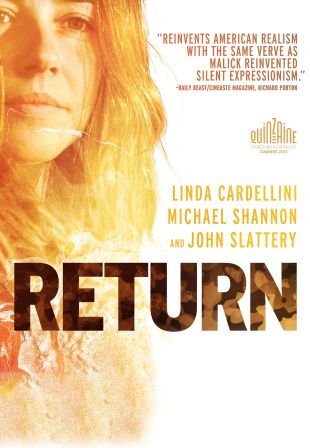
It's hard enough for most of us to imagine the pain of leaving our families behind to fight a war overseas, with no guarantee that we'll ever make it back home alive; now imagine the trauma of returning to the town where you grew up after fighting that war, and realizing that the friends you've known your whole life are suddenly strangers. This is the plight faced by stoic veteran Kelli, capably played with quiet desperation by film-and-television veteran Linda Cardellini, in writer/director Liza Johnson's compelling and earnest debut feature Return. But while veterans and their loved ones will surely be moved by the honesty with which the filmmaker approaches this delicate character study, murky plotting, a detached protagonist, and a poignant yet abrupt ending prevent the drama from truly resonating.
Kelli (Cardellini) has just returned home from serving her country, and all she wants is to experience life the way it was before the war. But as her friends seek solace in the minutiae of small-town life and her children vie for her undivided attention, a chasm begins to open up between Kelli and her loving husband Mike (Michael Shannon), who can't relate to her experiences on the battlefield. Now, as the comfortable life Kelli once knew becomes a distant memory, she struggles to forge a new path into an uncertain future.

With the Iraq War winding down and the subject of returning veterans a hot topic of discussion, Johnson's debut feature arrives at just the right time to get us thinking seriously about how we welcome home our servicemen and women. Quiet and reflective, the film does a commendable job of conveying the difficulties these soldiers face as they attempt to reintegrate themselves into society, with Johnson's naturalistic dialogue and the movie's handheld camerawork giving it an intimate cinema verité feel. Alternating between Kelli's work life and family life early on, the screenplay opts for a restrained, low-key approach that's perfectly complimented by Cardellini's withdrawn, hollow-eyed performance. The more time we spend with the character, the more apparent it becomes that, despite knowing street names and recognizing familiar faces, Kelli is hopelessly lost in her own hometown; she's emotionally adrift and reluctant to face reality as she repeats her mantra, "a lot of people had it a lot worse," whenever pressed about her wartime experience. Kelli just wants to forget about her tour of duty, but something inside simply will not let her.
The subtle approach that draws us into the story early on becomes its greatest liability later, however, when Kelli's fragile web of support begins to fall apart, sending her into a tragic tailspin that threatens life-altering repercussions. By refusing to allow Kelli any scenes of recognizable catharsis, Johnson neglects to give her film -- or the character -- an emotional core. As a result, Return hits a dramatic plateau somewhere near the mid-point and never swells to a satisfying conclusion despite some nice directorial touches (a conversation between Kelli and her eldest daughter, played at a distance and with the dialogue inaudible, tells us everything we need to know without a single word) and strong performances all around.

Fast gaining a reputation as one of the most talented actors of his generation, Shannon portrays Kelli's husband Mike with a sense of playfulness that keeps us connected to him even after he reveals a troubling secret. And as a drug-addicted fellow veteran who defends Kelli during an intense group-therapy session, Mad Men star John Slattery offers a haunting glimpse into her future should she fail to take control of her life.
Sadly, after the title takes on a new meaning late in the story, Kelli's journey and the film come to an abrupt end, effectively robbing Return of a real resolution. Though ambiguity can be a powerful tool for encouraging deeper thought and intelligent discussion when used in the right context, here it merely serves to stop the story rather than end it. Still, despite this shortcoming, Johnson makes an impressive feature debut buoyed by some genuinely memorable performances. And by displaying a talent for tackling such a difficult subject matter with confidence and control in the director's chair, she'll likely be a big talent to watch in the future.
